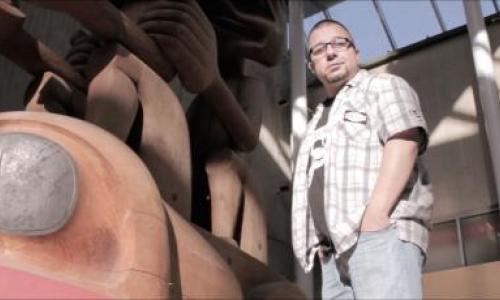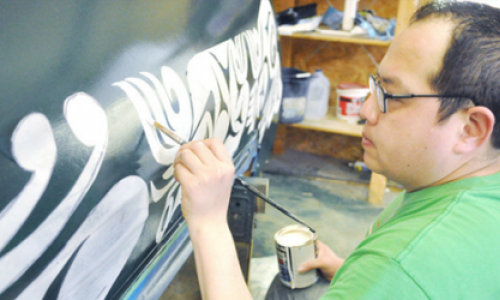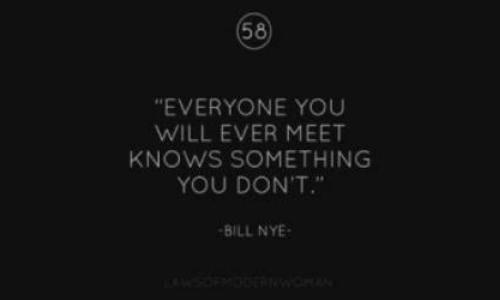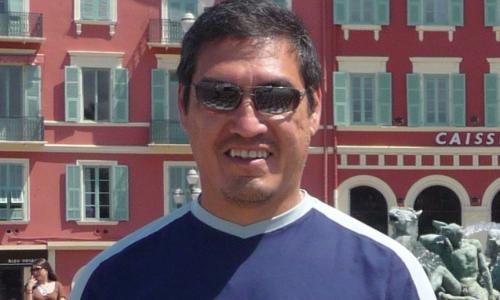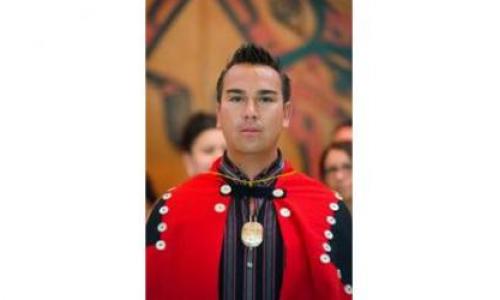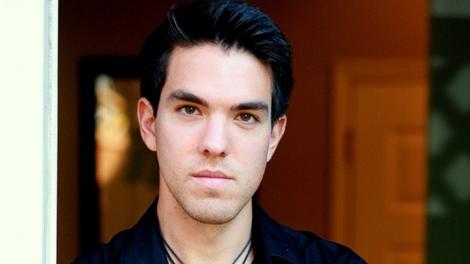
First Nations Filmmaker Wins Kudos
First Nations filmmaker Kelvin Redvers, an SFU alumnus, picked up his second Webster Award last fall, for Best Feature—Television. The Webster awards recognize the best in B.C. journalism each year.
Redvers, the producer of CTV-BC’s First Story, an Aboriginal current affairs program, won the award for A Home for Edgar. The feature examines homelessness versus social housing from a cost/benefit perspective.
Redvers joined CTV as a producer just three months after graduating from SFU in June 2010 with a Bachelor of Fine Arts.
He has since produced 12 episodes for First Story over three seasons.
In 2011, his feature Black Blood—Tainted Land, Dying Caribou, about unknown oil spills in northeastern British Columbia, won the Webster Award for Science, Technology, Environment and Health.
His shows have also won three RTDNA awards, which honour the best in Canadian radio and TV journalism, from the Association of Electronic Journalists.
In addition to his work for CTV, Redvers is working on an independent short film, Rattlesnake, which he funded through Indiegogo, an online crowdfunding site.
His previous short, The Dancing Cop—a musical about native people and police officers—premiered at the Toronto International Film Festival last year.
He is currently working on his first feature film.
“My ultimate goal,” says Redvers, “is to become an established feature filmmaker, working in the mainstream film industry.”
Kelvin's Perspective
For of the industry that I am in, I am a very young person
Throughout my life, I have seen a gap of understanding between the world that First Nations people live in, and the way Western Culture perceives us. My goal has always been to try to close that gap: to tell stories that are accessible to audiences all over the globe, but also give insight into the lives of First Nations people, in a way that helps us all get along better. The tricky thing is, you can’t just go into a school to be taught how to do this specifically. So, my life has been one of pulling information and inspiration from a wide variety of sources (sometimes unlikely sources), and spending a lot of time in the classroom, pushing to learn more, then putting everything I’ve learned together in a way that makes sense for what I want to do.
When my sisters and I were kids, our parents were always immensely adamant about how important doing well at school was. They would push us to read and write better, to work hard on assignments, double check essays or tests. At a young age, I think this taught us that no matter what we were working on, or who we were working for, it was always important to put in your best effort.
For the industry I work in, I’m a very young person. I am twenty-five as I write this, yet have had many moments and opportunities I’m very grateful for: I’ve spent two seasons working as a producer at a major TV station in Vancouver on the show First Story, I’ve travelled around the world to glamorous film festivals, I have seen my work air on the big and small screen many times, and I’ve attended a fair share of glitzy awards ceremonies. I am very proud of these accomplishments, and I’d attribute a lot of this success to the behaviour I picked up as a kid, of putting the best foot forward no matter what the circumstances are. In fact, I think a lot of the most meaningful “education” I’ve had, was in experiences not directly related to the field of filmmaking, rather in other endeavors I poured a lot of heart into.
In university, I did a lot of work with the First Nations Student Association, and one of my favourite activities was organizing social events/performances, such as coffee houses or feasts. It brought a lot of joy to put on these events: to showcase Aboriginal artists, to feed University students, it just seemed like generally a good cause. However, what I didn’t realize me at the time, is that what I was really doing, was honing my skills dealing with the logistics of organizing people and schedules on a large scale. 50% of having a successful film shoot is knowing how to effectively organize people and schedules. Sure enough, when I started be a part of larger scale film shoots, the skills I needed were actually sitting there in my back pocket. There’s no way I could have known this connection would work out… I was just keeping myself busy, proactively doing different things, and sure enough the skills I learned came in immensely in handy for my career.
In fact, all through high school and into university, often the classes I took that weren’t related directly to filmmaking were the ones that helped me out the most. Obviously for being a filmmaker, understanding the tools and equipment needed for a film shoot is important, but my goal is to be a storyteller, so I was taking acting classes, or English classes, or even business classes; these classes really broadened my perspective of the world, and I believe that is what helped me to become a more effective storyteller. Broadening of our perspectives on the world is really what I think the importance of education is. I figure this is why my parents pushed me towards taking a university degree program, as opposed to taking a year at a place like Vancouver Film School, where what’s learned is much more narrowly related to only the field of filmmaking. I am very happy that they nudged me towards taking my full degree (and that I listened), because when I was younger, I may not have opted for the longer, more winding road that university offers.
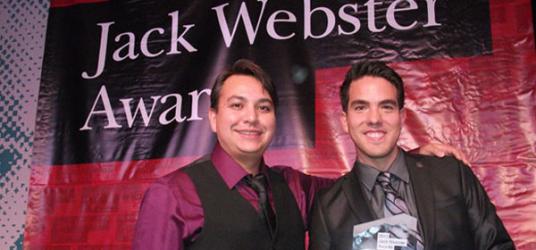
So my advice to any student is just to consume any bit of information that comes your way, no matter the discipline. In fact, take a few classes that you literally know nothing about, because you will be forced to learn a while new way of thinking, and the more you have to learn a completely new way of thinking, the more you become good at “learning to learn,” which I think is far more valuable than learning any actual facts. When you become really good at learning to learn, you’ll be good at problem solving, at adapting to new environments, which is what I have found many employers are looking for. I was three months out of a university program training to be film director, when I was hired as a journalist at CTV First Story. This is not something I was expecting, but I had to adapt quickly to producing thirty minutes of television content every few weeks, after I was used to spending about a year making a twelve minute short film. These are the kinds of things that life is going to throw at you, and I believe people who have spent time broadening their perspective, learning how to learn quickly, they will be the ones who flourish the most.
I also do feel like everything I’ve learned and gone though gives me a purpose. What brings me the most pride about my life, is after over a decade of making films (amidst constantly pushing for personal growth and improved self-understanding) I feel I’ve had the chance to tell a variety of Aboriginal stories that perhaps never would have been told, to bring light into some dark places where people are struggling. I am very proud of the episode Black Blood I did for CTV First Story, as the story brought attention to oil spills that had been sitting on the land in Northeast British Columbia, not cleaned up for years. The local First Nations had to deal with these oil spills on their land everyday, and were trying their hardest to have them taken care of, yet were struggling for a very long time to have their message heard. After the episode was finished, they were so gracious that we had taken the time to go and tell their story. This is really what I feel best about at the end of the day: giving voice to an elder or a concerned community member in an avenue that can actually spark change, and hopefully create some discussion in our communities.
I believe my desire to help bring understanding between First Nations people and the rest of the world is what drives both my educational and work career; it keeps pushing me to learn and try new things, and onto all kinds of different windy roads. So, I do hope that everyone out there has some sort of broad goal in life… I think if people have that, they’ll end up on all kinds of wild and wonderful paths in life, which I figure is a good thing!
Kelvin Redvers - First Story with CTV
Originally published on ctv.bc/ca Friday, May. 4, 2012 3:27PM PDT
Kelvin Redvers is a multiple award-winning Aboriginal filmmaker and television producer. Born and raised in the small town of Hay River in the Northwest Territories, he started his career while still in high school, doing projects on various Aboriginal topics for local First Nations. At the age of 15 Redvers started a video production company called Crosscurrent Productions. In his spare time, he made fictional short films with his classmates that went on to win national and international awards at film festivals around the world.
Kelvin Redvers is an award-winning reporter/producer with CTV's First Story Aboriginal current affairs program. Monday, April 30, 2012. Vancouver, B.C. (CTV)
Attending Simon Fraser University in Vancouver on full scholarship, Redvers continued film work on both Aboriginal and non-Aboriginal topics, continually achieving success at film festivals in Canada and abroad. At age 21 Redvers had his first broadcast credit when "The Making of a Haida Totem Pole" aired nationwide on Bravo! Canada. Two projects Redvers worked on are also on archive at the National Museum of the American Indian in Washington, D.C. Redvers graduated from Simon Fraser University with a BFA, major in film production and was awarded the Gordon Shrum Gold Medal, the most prestigious award available to any student at SFU.
After the successful project "Our First Voices" for the Knowledge Network, Redvers was hired on as a producer on the acclaimed Aboriginal current affairs show CTV First Story, where the first episode he produced, "Black Blood," went on to win the prestigious Jack Webster Award for best in B.C. journalism in the category of Science, Environment, Technology and Health. The same episode also went on to win the RTDNA Trina McQueen Award for Best News Information Program in B.C., and his episode "Death of a Carver" won the same award the following year.
He has recently finished a Bravo!FACT short film called "The Dancing Cop," and is beginning to work on his first feature film. He always makes time to return home to N.W.T. for hunting, fishing and taking part in traditional activities, staying true to his Chipwyan roots.









